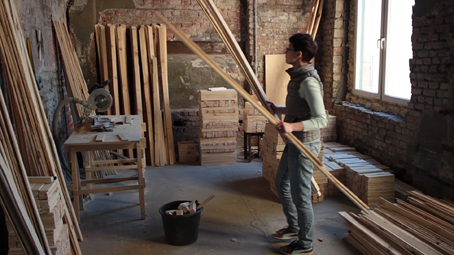Natalia Zintsova
Studio grant holder in Umeå September – November 2019
Born in 1971, in Moscow. Graduated from the Russian Academy of Theatre Arts (GITIS), Moscow (1990—1995), Moscow State University of Printing Arts (1997—2004) and the Institute of Problems of Contemporary Art, Moscow (2006—2007).
If I try to find the key words to describe my artistic practice, then amongst them, side by side one might find ’a thing’ and ’escape’, ’touch’ and ’transparency’, ’particularity’ and ’absence’. If I try to generalize, then the basic Bergsonian semantic couple ’matter and memory’ comes into focus. It is important that they both relate to feeling, sensuality, sensitivity. The memory ’materializes’ the language. The idea that memory is palpable, is explored in the installations Tenderness (2007) and Films (2008), where the stills from the films by Gus Van Sant and Peter Weir are transferred onto the bubble wrap; these movies speak about the mystery of leaving and disappearance.
The memory was realized through the muscular effort, through the crafts, as in the series New Life Forms (2009-2012), where the ready-made objects were manually reproduced by the artist. The memory is finding the rhymes in the images of illusion, infinitely far from each other, as in the installation Illuzion (2008), where the layouts of the chairs in the Soviet cinema halls resemble the stained glass in the gothic cathedrals. Understood in this functional, instrumental, and the same time in a magical way, the artist’s memory becomes both the permanent work of vision and body, and the method of materializing oneself here and now, in every moment of dissolution and loss.
I’ve heard about one popular movement in Sweden, Swedish Death Cleaning, which means getting rid of unnecessary things at home in order to preserve only those items which will be significant for relatives to keep to remember. As an artist, I’m interested in the opposite and precisely in the things that were rejected — discarded, broken. I believe, the most insignificant and useless objects and routine everyday situations could become the markers of the processes shared by many.
I consider it to be my task to collect such discarded things. The way to do it is to be in a constant movement and to observe, ’sailing’ in the city. I seek to extract the poetic from the everyday life and attempt to reveal the political through the intimate. I want to act as freely as possible, using the simpliest means of recording — drawing, photography and video documentation.
I am hoping that a result of my stay at the residence would be the presentation of these accumulated observations, a kind of a poetic diary, and importantly, the following discussion with the audience.


